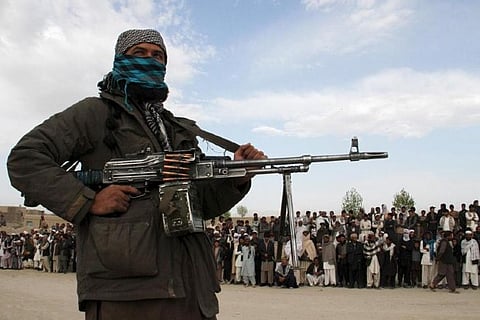

Kabul
The Taliban have captured a large, heavily defended city in northern Afghanistan in a major setback for the government, and the insurgents are approaching the capital less than three weeks before the US hopes to complete its troop withdrawal.
The fall of Mazar-e-Sharif, the country's fourth-largest city, which Afghan forces and two powerful former warlords had pledged to defend, hands the insurgents control over all of northern Afghanistan, confining the Western-backed government to the center and east.
Abas Ebrahimzada, a lawmaker from the Balkh province where the city is located, said the national army surrendered first, which prompted pro-government militias and other forces to lose morale and give up in the face of a Taliban onslaught launched earlier Saturday.
Ebrahimzada said Abdul Rashid Dostum and Ata Mohammad Noor, former warlords who command thousands of fighters, had fled the province and their whereabouts were unknown.
The Taliban have made major advances in recent days, including capturing Herat and Kandahar, the country's second-and third-largest cities. They now control about 24 of Afghanistan's 34 provinces, leaving the Western-backed government with a smattering of provinces in the center and east, as well as the capital, Kabul.
On Saturday, the Taliban captured all of Logar province, just south of Kabul, and detained local officials, said Hoda Ahmadi, a lawmaker from the province. She said the Taliban have reached the Char Asyab district, just 11 kilometers (7 miles) south of the capital.
Later, the insurgents took over Mihterlam, the capital of Laghman province, northeast of Kabul, without a fight, according to Zefon Safi, a lawmaker from the province.
Afghan President Ashraf Ghani had flown to Mazar-e-Sharif on Wednesday to rally the city's defenses, meeting with several militia commanders, including Dostum and Noor.
On Saturday, Ghani delivered a televised speech, his first public appearance since the recent Taliban gains. He vowed not to give up the “achievements” of the 20 years since the U.S. toppled the Taliban after the 9/11 attacks.
The U.S. has continued holding peace talks between the government and the Taliban in Qatar this week, and the international community has warned that a Taliban government brought about by force would be shunned. But the insurgents appear to have little interest in making concessions as they rack up victories on the battlefield.
“We have started consultations, inside the government with elders and political leaders, representatives of different levels of the community as well as our international allies,” Ghani said. “Soon the results will be shared with you,” he added, without elaborating further.
Hours later, his forces suffered one of the biggest setbacks since the Taliban offensive began.
Mazar-e-Sharif, home to a famous blue-tiled Muslim shrine, was a stronghold of the Northern Alliance, ethnic militias who helped the U.S. topple the Taliban in 2001.
In 1997, as many as 2,000 Taliban fighters were captured and killed by forces loyal to Mohammed Mohaqiq, a Shiite Hazara leader, and his ethnic Uzbek allies. The following year, the Taliban returned and killed thousands of Hazaras in Mazar-e-Sharif in a revenge attack.
Several makeshift camps had sprung up around Mazar-e-Sharif were mostly ethnic Hazaras had taken shelter after fleeing their homes in outlying areas. They said the Taliban had detained relatives who sought to leave their districts and in some cases burned schools.
Tens of thousands of Afghans have fled their homes, with many fearing a return to the Taliban's oppressive rule. The group had previously governed Afghanistan under a harsh version of Islamic law in which women were forbidden to work or attend school, and could not leave their homes without a male relative accompanying them.
Salima Mazari, one of the few female district governors in the country, expressed fears about a Taliban takeover earlier Saturday in an interview from Mazar-e-Sharif before it fell.
“There will be no place for women,” said Mazari, who governs a district of 36,000 people near the northern city. “In the provinces controlled by the Taliban, no women exist there anymore, not even in the cities. They are all imprisoned in their homes.” The Taliban also captured the capital of Paktika, bordering Pakistan, according to Khalid Asad, a lawmaker from the province. He said fighting broke out in Sharana early Saturday but ended after local elders intervened to negotiate a pullout. The small province of Kunar, also bordering Pakistan, fell without a fight, according to Neamatullah Karyab, a lawmaker from the area.
Sayed Hussan Gerdezi, a lawmaker from the neighboring Paktia province, said the Taliban seized most of its local capital, Gardez, but that battles with government forces were still underway. The Taliban said they controlled the city.
The Taliban also took control of Faryab province in the north and the central province of Daykundi, lawmakers from those areas said.
The withdrawal of foreign troops and the swift collapse of Afghanistan's own forces — despite hundreds of billions of dollars in U.S. aid over the years — has raised fears the Taliban could return to power or that the country could be shattered by factional fighting, as it was after the Soviet withdrawal in 1989. It's also prompted many American and Afghan veterans of the conflict to question whether two decades of blood and treasure was worth it.
Visit news.dtnext.in to explore our interactive epaper!
Download the DT Next app for more exciting features!
Click here for iOS
Click here for Android